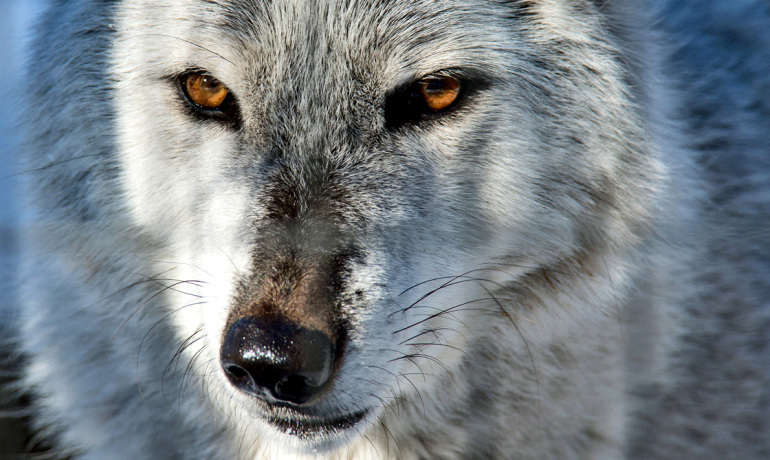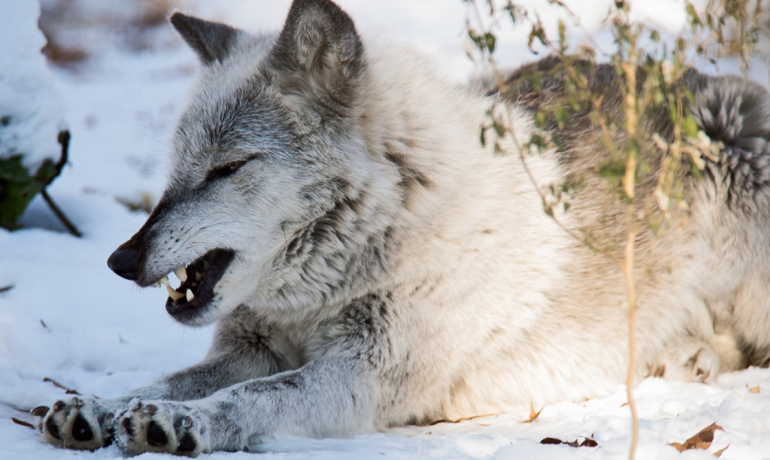Michigan State University
Original Study
Posted by Layne Cameron-Michigan State on
The first study, published in the Journal of Wildlife Management, looks at how perceptions of power and scientific knowledge affect decisions about hunting wolves.
The results indicate that tension between public attitudes about local knowledge, as well as politics and science, can drive conflict among Michigan residents’ stances regarding wolf-hunting, says Meredith Gore, associate professor of fisheries and wildlife at Michigan State University and co-lead author of the study. “Given the trend in wildlife management toward increased stakeholder input, finding solutions that approach science and politics as complementary, rather than competing, approaches may aid the public participation processes,” she says.
(Credit: G. L. Kohuth/Michigan State)
Gore and Michelle Lute, former Michigan State fisheries and wildlife graduate student and co-lead author who’s now at Indiana University, unearthed these disparities by conducting in-depth interviews with many stakeholders close to the wolf debate. Rather than trying to prove a specific theory, the researchers allowed the interviews to reveal the main criteria driving the issue.
Four big concerns
The researchers unearthed four themes and offered potential solutions to each.- Mistrust among decision-makers: Some interviewees view wildlife management agencies as political agencies rather than supporting what’s best for wildlife. Increasing transparency and gathering more stakeholder input could increase trust.
- Special interest groups leaving many voters disenfranchised: Strong lobbying groups leave some individuals feeling powerless and their votes meaningless. Striving for equitable distribution of risks and benefits among all stakeholders could address these feelings.
- Political influencers overriding science: Some believe that political official downplay scientific studies. Equitable sharing of responsibility, risks, and benefits may ease perceptions of tension between politicians and scientists.
- Decision-makers ignoring local sources of information: Some interviewees felt cast aside, and their knowledge was labeled as mythology or folklore. Processes that seek shared-learning outcomes may balance local and scientific knowledge.
Fear and caring
The second study, published in PLOS ONE, suggests that fear of wolves or the urge to care for Canis lupus fuel the divisive debate. “People who are for or against this issue are often cast into traditional lots, such as gender, political party, or where they live,” says Gore, who co-led the study with Lute. “This issue, however, isn’t playing out like this. Concerns about hunting wolves to reduce conflict are split more by social geography and less by physical geography.”It’s definitely an us-versus-them debate, she adds. Applying principles from social psychology reveals how the two groups tend to interact and offers some potential solutions to get the vying groups to work together. “Our findings challenge traditional assumptions about regional differences and suggest a strong role for social identity in why people support or oppose wildlife management practices.”
While the study focused on gray wolves in Michigan, its results have implications for other states’ policies on wolves as well as other large carnivores such as brown bears, polar bears, mountain lions, and other predators, Gore adds.
Building trust
Noting that there’s sharp polarization in debates about wolf management is not new. Providing empirical evidence of its existence, however, could provide a framework for improving engagement between the fighting factions.
(Credit: G. L. Kohuth/Michigan State)
Also, by shaping and discussing the issue in terms of care and fear, rather than traditional qualifiers, may help usher in a greater agreement about management strategies.
Additional researchers working on the PLOS ONE paper include Adam Bump of the Michigan Department of Natural Resources.
source






No comments:
Post a Comment